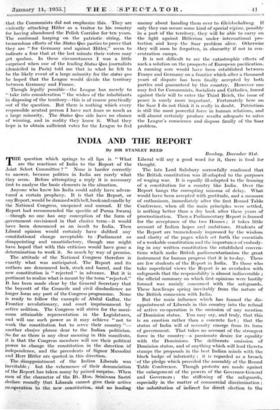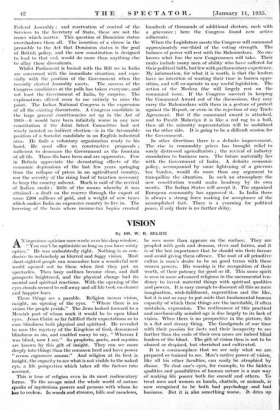INDIA AND THE REPORT
By SIR STANLEY REED
THE question which springs to all lips is " What are the reactions of India to the Report of the Joint Select Committee ? " None is harder correctly to answer, because politics in India are rarely what . they seem. Before attempting a reply it is necessary first to analyse the basic elements in the situation.
Anyone who knew his India could safely have adven- tured a certain prophecy. It is that the Report, or any Report, would be damned with bell, book and candle by the National Congress, unopened and unread. If the Report had. recommended the specific. of Purna Swaraj —though no one ,has any conception of the form of ,government envisioned in that elusive term—it would have heen denounced as an insult to India. Then Liberal opinion would certainly have dubbed any constitutional change acceptable to f,Parliament as disappointing and unsatisfactory, though one might have hoped that with this criticism would have gone a -determination to work it: So much by way of premiss.
The attitude of the National Congress therefore is exactly - what was anticipated. The Report and its authors are denounced lock, stock and barrel, and the new-constitution is " rejected " in advance. But it • is pertinent to realize what is meant by the term "rejected." It has been made clear by the General Secretary that the boycott of the Councils and civil disobedience no longer form any part of the Congress programme. None is ready to follow the example of • Abdul Gaffar, the Frontier revolutionary, and court imprisonment by ;active sedition. The Congress -will strive for the maxi- mum attainable representation in the Legislatures, and will use such power as it may achieve " not to work the constitution but to serve their . country "- another elusive phrase dear to the Indian politician. So-far as- there is any clear meaning in this manifesto, it is that the Congress -members will use their political power to Rhanie the constitution in the direction Of ..independence, and the precedents of Signor Mussolini and Herr Hitler are quoted. in -this direction. - The.disappointment of the Indian Liberals was inevitable ; but the .vehemence of -their denunciation of the Report has taken many by pained surprise.- When :men of the character of the Rt. Hon. Srinivasa Sastri .declare roundly that Liberals. cannot give their active _eo-operation to the new -constitution,' and no leading Bombay, December 31st. Liberal will say a good word for it, there is food for thought.
The late Lord Salisbury sorrowfully confessed that the British constitution was ill-adapted to the purposes of waging war. It is equally ill-adapted to the framing of a constitution for a country like India. Over the Report hangs the corrupting miasma of delay. What would have been accepted with gratitude, and a measure of enthusiasm, immediately after the first Round Table Conference, when all the main principles were settled, is nothing better than a dry husk after these years of procrastination. Then a Parliamentary Report is framed for the acceptance of the two Houses ; it takes little account of Indian hopes and ambitions. Students of the Report are tremendously impresged by the wisdom -and clarity of the pages which set forth the essentials of a workable constitution and the importance of embody- ing in any written constitution the -established conven- tions which make British parliamentarianism the great instrument for human progress that it is to-day. There are few students of the Report in India. To those who take superficial views the Report is so overladen with safeguards that the responsibility is almost indiscernible ; the official summary on which first opinions were hastily formed was mainly concerned with the safeguards. These handicaps spring inevitably from the nature of the British connexion with India..
But the main influence which has fanned the dis- appointment of Liberals in this country into the refusal of active co-operation is the omission -of any mention of Dominion status. You may say, and truly, that this is an emotion rather than a concrete fact ; that the status of India will of necessity emerge from its form of government. That takes no account of the strongest force in- the country—a passionate desire for equality with the Dominions. The deliberate omission of Dominion status, and of anything which will lead thereto stamps the proposals in the best Indian minds with the black badge of inferiority ; it is regarded as a breach of the pledge which preceded the assembly of the Round -Table Conference. Though protests are made against the enlargement of the powers of the Governor-General and Governors ; the stiffening • of the safeguards, -especially in the' matter of commercial discrimination ; ;the- substitution of indirect for direct election to the Federal Assembly ; and reservation of control of the Services to the Secretary. of State, these are not the issues which matter. This question of Dominion status overshadows them all. The insertion of a clause in the preamble to the Act that Dominion status is the goal of . British policy, and_ the new constitution is designed to lead to that end, would do more than anything- else to allay these discontents.
Whilst Parliament is busied with the Bill we in India are concerned with the immediate situation, and espe- cially with the position of the Government when the , recently elected Assembly meets. The success of the Congress candidates at the polls has taken everyone, and not least the Government of India, by surprise. The explanations offered seem to me entirely to miss the point. The Indian National Congress is the expression of all the existing discontents. A Congress candidate in the, large general constituencies set up in the Act of 1919—it would have been infinitely worse in any new constitution if the Joint Select Committee had not wisely insisted on indirect election—is in the favourable position of a Socialist candidate in an English industrial area. He finds a voluntary organization ready to his hand. He need offer no constructive proposals ; sufficient to denounce the Government as the fountain of all ills. Those ills have been and are oppressive. Few in Britain appreciate the devastating effects of the economic depressions of the last few years springing from the collapse of prices in an agricultural country, nor the severity of the rising load of taxation necessary to keep the country solvent. Much is said of the revival of Indian credit ; little of the means whereby it was attained—a draft on the reserve through the export of some £200 millions of gold, and a weight of new taxes which makes India an expensive country to live in. The lowering of the basis where income-tax begins created hundreds of thousands of additional electors, each with a grievance ; here the Congress found new active adherents.
When the Legislature .meets the Congress will command approximately one-third Of the voting strength. The balance of power will rest with the Mahomedans. No one knows what line the new Congressmen will take. The ranks include many men of ability who have suffered for their political faith, but few with parliamentary experience. My information, for what it is worth, is that the leaders have no intention of wasting their time in barren OppO- .sition, and will co-operate in any Useful legislation. The action of the Moslem bloc will largely rest on the communal issue. If the Congress succeed in keeping the Communal Award out of the discussions, they may carry the Mahomedans with them in a gesture of any - against the Report, or even in the rejection of any Trade Agreement. But if the communal award is attacked, and to Pandit Malaviya it is like a red rag to a, bull, then all the Minority 'representation will be mobilized on the other side. It is going to be a difficult session for the Government.
In other directions there is a definite improvement. The rise in commodity prices has brought relief to sorely distressed agriculturists ; the revival of industry consolation to business men. The future materially lies with the Government of India. A definite economic policy, accompanied by some lightening of a grievous tax burden, would do more than any argument to tranquillize the situation. In such an atmosphere the new constitution would make headway by its own merits. The Indian. States. will accept. it. The organized _European community has approved it. In India there is always a strong force making for acceptance of the accomplished fact. There is a yearning for political peace, if only there is no further delay.







































 Previous page
Previous page